Sociology Essay: Comparing Utilitarianism and Nietzsche's Philosophy
VerifiedAdded on 2023/04/26
|5
|1019
|224
Essay
AI Summary
This sociology essay examines two prominent philosophical viewpoints: utilitarianism and the philosophy of Friedrich Nietzsche. The essay begins by defining utilitarianism as a normative ethical theory, differentiating between act and rule utilitarianism, and discussing its core principles, including the emphasis on maximizing happiness and minimizing pain. It then transitions to Nietzsche's philosophy, focusing on his concept of self-realization and the will to power, while also touching upon critiques of his work. The essay further contrasts Nietzsche's ideas with Kantian ethics, highlighting Kant's perspective on actions that are inherently prohibited, regardless of their potential outcomes. The essay concludes with a list of references, providing sources for the information presented.
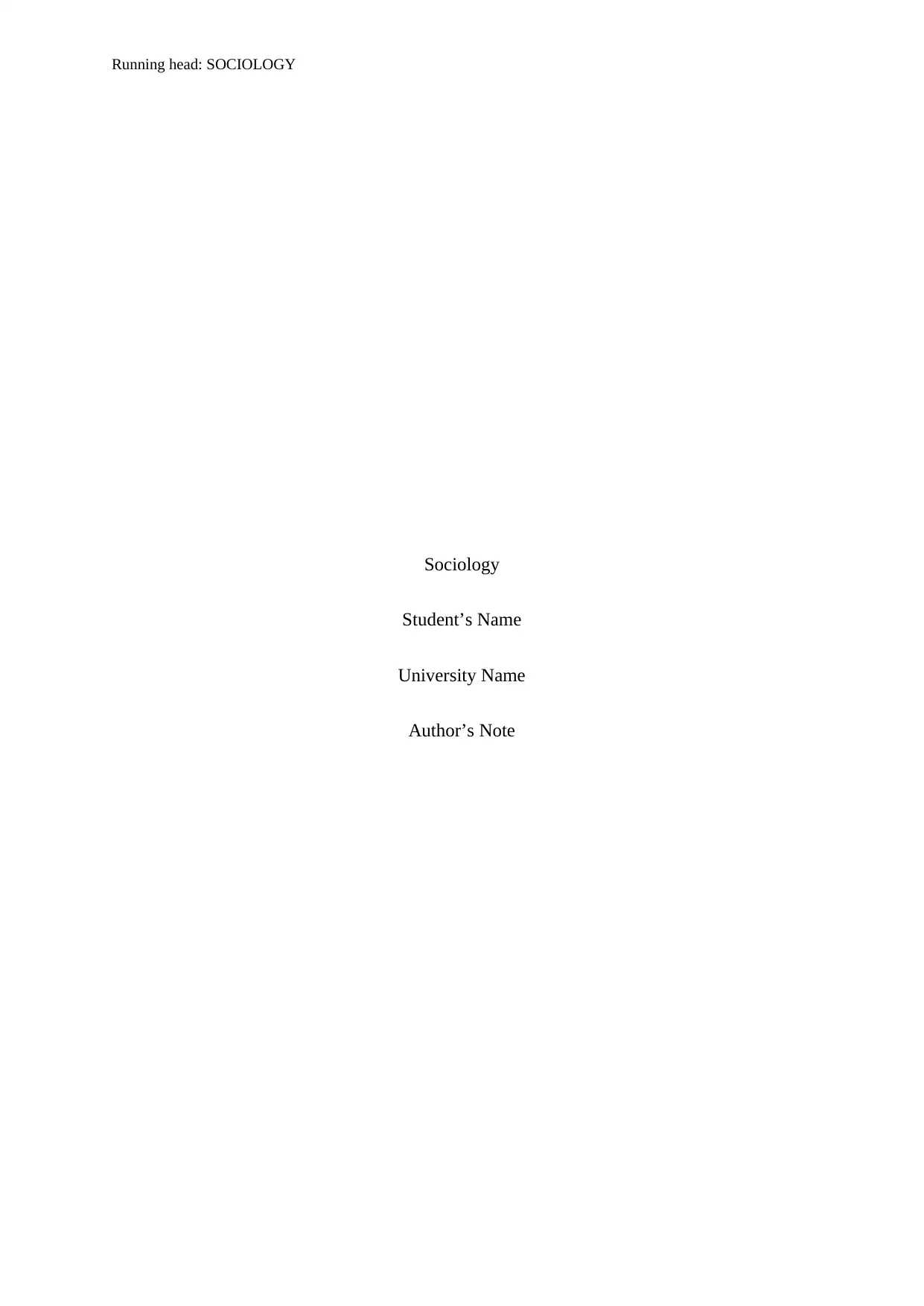
Running head: SOCIOLOGY
Sociology
Student’s Name
University Name
Author’s Note
Sociology
Student’s Name
University Name
Author’s Note
Paraphrase This Document
Need a fresh take? Get an instant paraphrase of this document with our AI Paraphraser
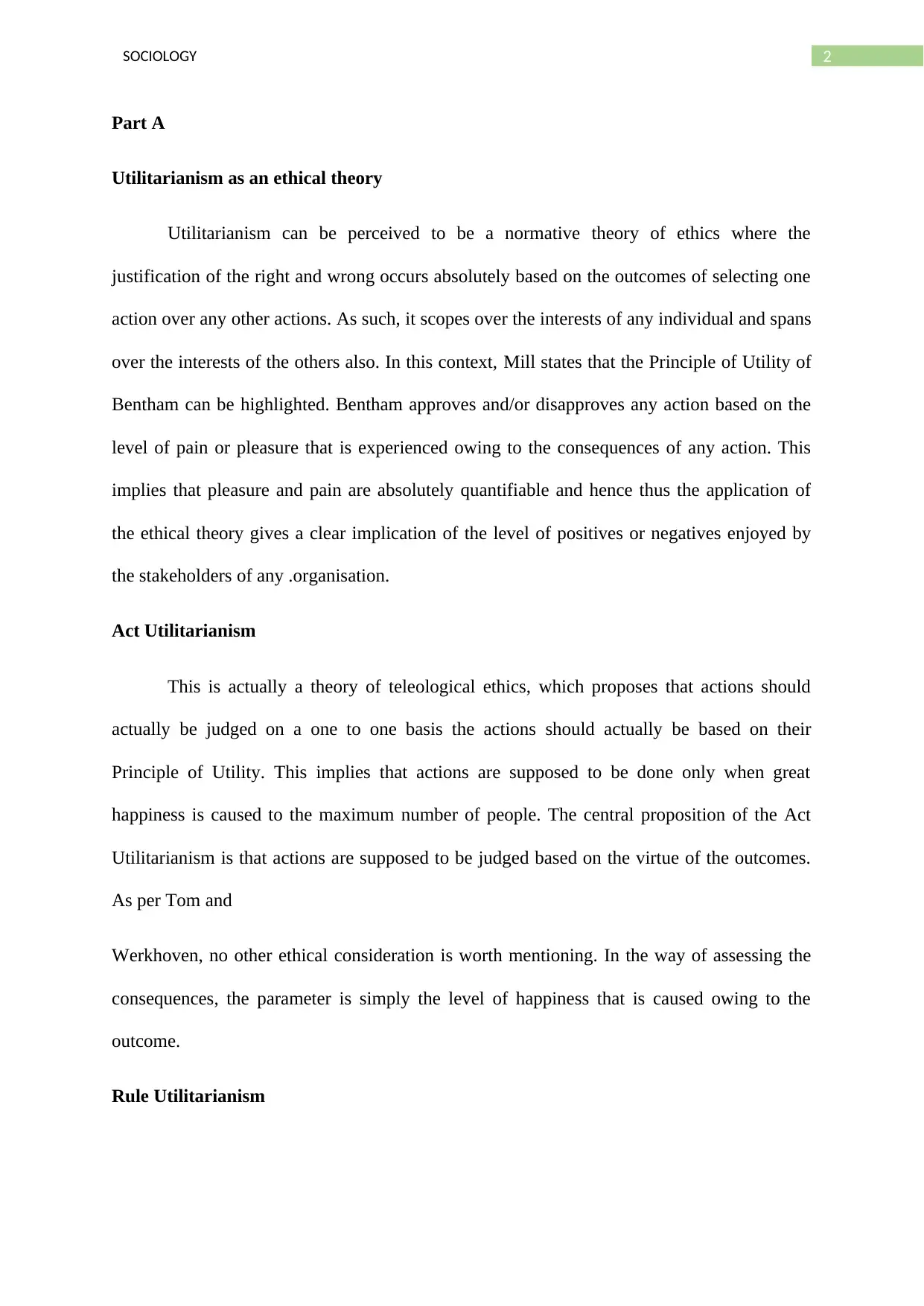
2SOCIOLOGY
Part A
Utilitarianism as an ethical theory
Utilitarianism can be perceived to be a normative theory of ethics where the
justification of the right and wrong occurs absolutely based on the outcomes of selecting one
action over any other actions. As such, it scopes over the interests of any individual and spans
over the interests of the others also. In this context, Mill states that the Principle of Utility of
Bentham can be highlighted. Bentham approves and/or disapproves any action based on the
level of pain or pleasure that is experienced owing to the consequences of any action. This
implies that pleasure and pain are absolutely quantifiable and hence thus the application of
the ethical theory gives a clear implication of the level of positives or negatives enjoyed by
the stakeholders of any .organisation.
Act Utilitarianism
This is actually a theory of teleological ethics, which proposes that actions should
actually be judged on a one to one basis the actions should actually be based on their
Principle of Utility. This implies that actions are supposed to be done only when great
happiness is caused to the maximum number of people. The central proposition of the Act
Utilitarianism is that actions are supposed to be judged based on the virtue of the outcomes.
As per Tom and
Werkhoven, no other ethical consideration is worth mentioning. In the way of assessing the
consequences, the parameter is simply the level of happiness that is caused owing to the
outcome.
Rule Utilitarianism
Part A
Utilitarianism as an ethical theory
Utilitarianism can be perceived to be a normative theory of ethics where the
justification of the right and wrong occurs absolutely based on the outcomes of selecting one
action over any other actions. As such, it scopes over the interests of any individual and spans
over the interests of the others also. In this context, Mill states that the Principle of Utility of
Bentham can be highlighted. Bentham approves and/or disapproves any action based on the
level of pain or pleasure that is experienced owing to the consequences of any action. This
implies that pleasure and pain are absolutely quantifiable and hence thus the application of
the ethical theory gives a clear implication of the level of positives or negatives enjoyed by
the stakeholders of any .organisation.
Act Utilitarianism
This is actually a theory of teleological ethics, which proposes that actions should
actually be judged on a one to one basis the actions should actually be based on their
Principle of Utility. This implies that actions are supposed to be done only when great
happiness is caused to the maximum number of people. The central proposition of the Act
Utilitarianism is that actions are supposed to be judged based on the virtue of the outcomes.
As per Tom and
Werkhoven, no other ethical consideration is worth mentioning. In the way of assessing the
consequences, the parameter is simply the level of happiness that is caused owing to the
outcome.
Rule Utilitarianism
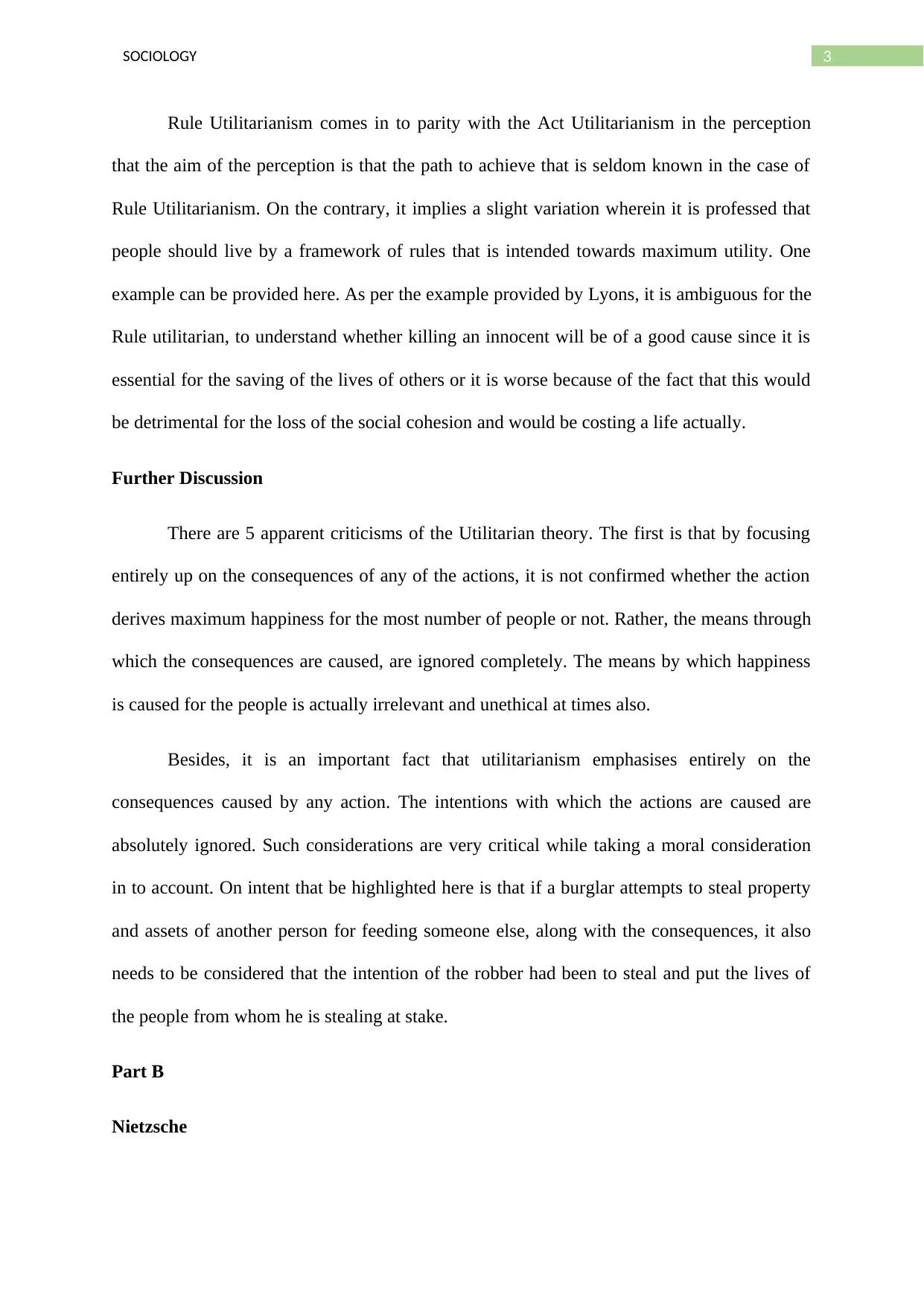
3SOCIOLOGY
Rule Utilitarianism comes in to parity with the Act Utilitarianism in the perception
that the aim of the perception is that the path to achieve that is seldom known in the case of
Rule Utilitarianism. On the contrary, it implies a slight variation wherein it is professed that
people should live by a framework of rules that is intended towards maximum utility. One
example can be provided here. As per the example provided by Lyons, it is ambiguous for the
Rule utilitarian, to understand whether killing an innocent will be of a good cause since it is
essential for the saving of the lives of others or it is worse because of the fact that this would
be detrimental for the loss of the social cohesion and would be costing a life actually.
Further Discussion
There are 5 apparent criticisms of the Utilitarian theory. The first is that by focusing
entirely up on the consequences of any of the actions, it is not confirmed whether the action
derives maximum happiness for the most number of people or not. Rather, the means through
which the consequences are caused, are ignored completely. The means by which happiness
is caused for the people is actually irrelevant and unethical at times also.
Besides, it is an important fact that utilitarianism emphasises entirely on the
consequences caused by any action. The intentions with which the actions are caused are
absolutely ignored. Such considerations are very critical while taking a moral consideration
in to account. On intent that be highlighted here is that if a burglar attempts to steal property
and assets of another person for feeding someone else, along with the consequences, it also
needs to be considered that the intention of the robber had been to steal and put the lives of
the people from whom he is stealing at stake.
Part B
Nietzsche
Rule Utilitarianism comes in to parity with the Act Utilitarianism in the perception
that the aim of the perception is that the path to achieve that is seldom known in the case of
Rule Utilitarianism. On the contrary, it implies a slight variation wherein it is professed that
people should live by a framework of rules that is intended towards maximum utility. One
example can be provided here. As per the example provided by Lyons, it is ambiguous for the
Rule utilitarian, to understand whether killing an innocent will be of a good cause since it is
essential for the saving of the lives of others or it is worse because of the fact that this would
be detrimental for the loss of the social cohesion and would be costing a life actually.
Further Discussion
There are 5 apparent criticisms of the Utilitarian theory. The first is that by focusing
entirely up on the consequences of any of the actions, it is not confirmed whether the action
derives maximum happiness for the most number of people or not. Rather, the means through
which the consequences are caused, are ignored completely. The means by which happiness
is caused for the people is actually irrelevant and unethical at times also.
Besides, it is an important fact that utilitarianism emphasises entirely on the
consequences caused by any action. The intentions with which the actions are caused are
absolutely ignored. Such considerations are very critical while taking a moral consideration
in to account. On intent that be highlighted here is that if a burglar attempts to steal property
and assets of another person for feeding someone else, along with the consequences, it also
needs to be considered that the intention of the robber had been to steal and put the lives of
the people from whom he is stealing at stake.
Part B
Nietzsche
⊘ This is a preview!⊘
Do you want full access?
Subscribe today to unlock all pages.

Trusted by 1+ million students worldwide
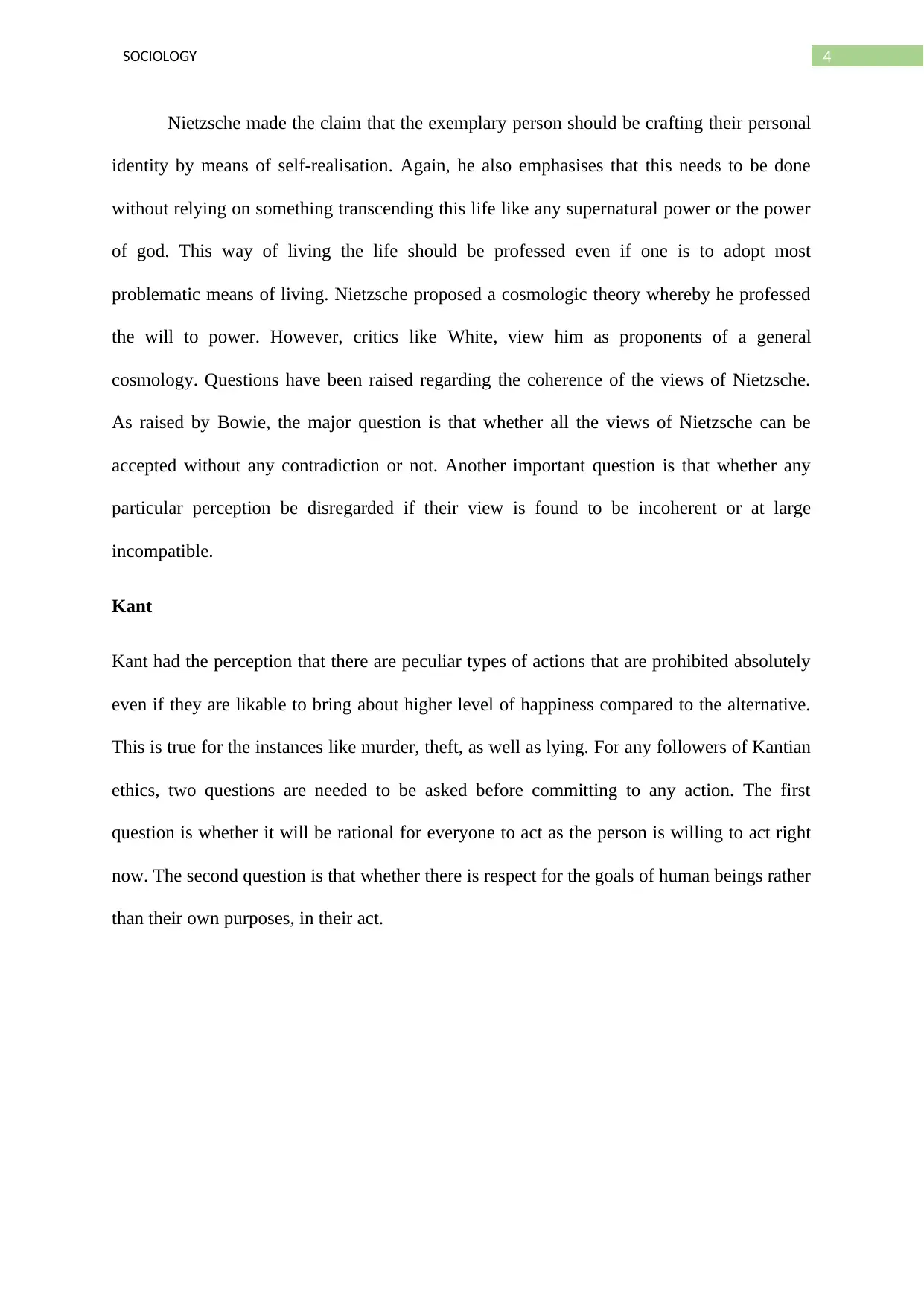
4SOCIOLOGY
Nietzsche made the claim that the exemplary person should be crafting their personal
identity by means of self-realisation. Again, he also emphasises that this needs to be done
without relying on something transcending this life like any supernatural power or the power
of god. This way of living the life should be professed even if one is to adopt most
problematic means of living. Nietzsche proposed a cosmologic theory whereby he professed
the will to power. However, critics like White, view him as proponents of a general
cosmology. Questions have been raised regarding the coherence of the views of Nietzsche.
As raised by Bowie, the major question is that whether all the views of Nietzsche can be
accepted without any contradiction or not. Another important question is that whether any
particular perception be disregarded if their view is found to be incoherent or at large
incompatible.
Kant
Kant had the perception that there are peculiar types of actions that are prohibited absolutely
even if they are likable to bring about higher level of happiness compared to the alternative.
This is true for the instances like murder, theft, as well as lying. For any followers of Kantian
ethics, two questions are needed to be asked before committing to any action. The first
question is whether it will be rational for everyone to act as the person is willing to act right
now. The second question is that whether there is respect for the goals of human beings rather
than their own purposes, in their act.
Nietzsche made the claim that the exemplary person should be crafting their personal
identity by means of self-realisation. Again, he also emphasises that this needs to be done
without relying on something transcending this life like any supernatural power or the power
of god. This way of living the life should be professed even if one is to adopt most
problematic means of living. Nietzsche proposed a cosmologic theory whereby he professed
the will to power. However, critics like White, view him as proponents of a general
cosmology. Questions have been raised regarding the coherence of the views of Nietzsche.
As raised by Bowie, the major question is that whether all the views of Nietzsche can be
accepted without any contradiction or not. Another important question is that whether any
particular perception be disregarded if their view is found to be incoherent or at large
incompatible.
Kant
Kant had the perception that there are peculiar types of actions that are prohibited absolutely
even if they are likable to bring about higher level of happiness compared to the alternative.
This is true for the instances like murder, theft, as well as lying. For any followers of Kantian
ethics, two questions are needed to be asked before committing to any action. The first
question is whether it will be rational for everyone to act as the person is willing to act right
now. The second question is that whether there is respect for the goals of human beings rather
than their own purposes, in their act.
Paraphrase This Document
Need a fresh take? Get an instant paraphrase of this document with our AI Paraphraser
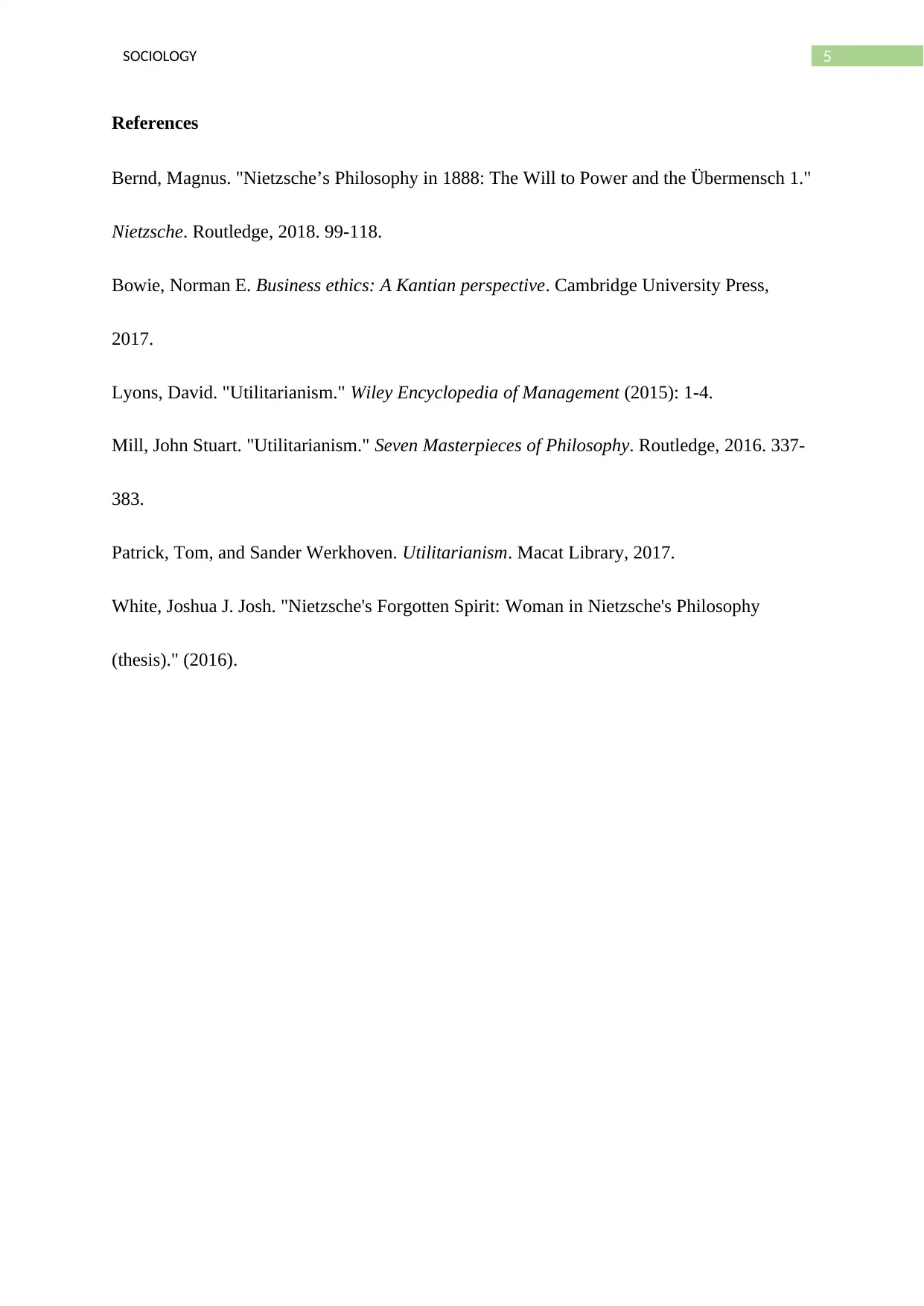
5SOCIOLOGY
References
Bernd, Magnus. "Nietzsche’s Philosophy in 1888: The Will to Power and the Übermensch 1."
Nietzsche. Routledge, 2018. 99-118.
Bowie, Norman E. Business ethics: A Kantian perspective. Cambridge University Press,
2017.
Lyons, David. "Utilitarianism." Wiley Encyclopedia of Management (2015): 1-4.
Mill, John Stuart. "Utilitarianism." Seven Masterpieces of Philosophy. Routledge, 2016. 337-
383.
Patrick, Tom, and Sander Werkhoven. Utilitarianism. Macat Library, 2017.
White, Joshua J. Josh. "Nietzsche's Forgotten Spirit: Woman in Nietzsche's Philosophy
(thesis)." (2016).
References
Bernd, Magnus. "Nietzsche’s Philosophy in 1888: The Will to Power and the Übermensch 1."
Nietzsche. Routledge, 2018. 99-118.
Bowie, Norman E. Business ethics: A Kantian perspective. Cambridge University Press,
2017.
Lyons, David. "Utilitarianism." Wiley Encyclopedia of Management (2015): 1-4.
Mill, John Stuart. "Utilitarianism." Seven Masterpieces of Philosophy. Routledge, 2016. 337-
383.
Patrick, Tom, and Sander Werkhoven. Utilitarianism. Macat Library, 2017.
White, Joshua J. Josh. "Nietzsche's Forgotten Spirit: Woman in Nietzsche's Philosophy
(thesis)." (2016).
1 out of 5
Related Documents
Your All-in-One AI-Powered Toolkit for Academic Success.
+13062052269
info@desklib.com
Available 24*7 on WhatsApp / Email
![[object Object]](/_next/static/media/star-bottom.7253800d.svg)
Unlock your academic potential
Copyright © 2020–2025 A2Z Services. All Rights Reserved. Developed and managed by ZUCOL.




